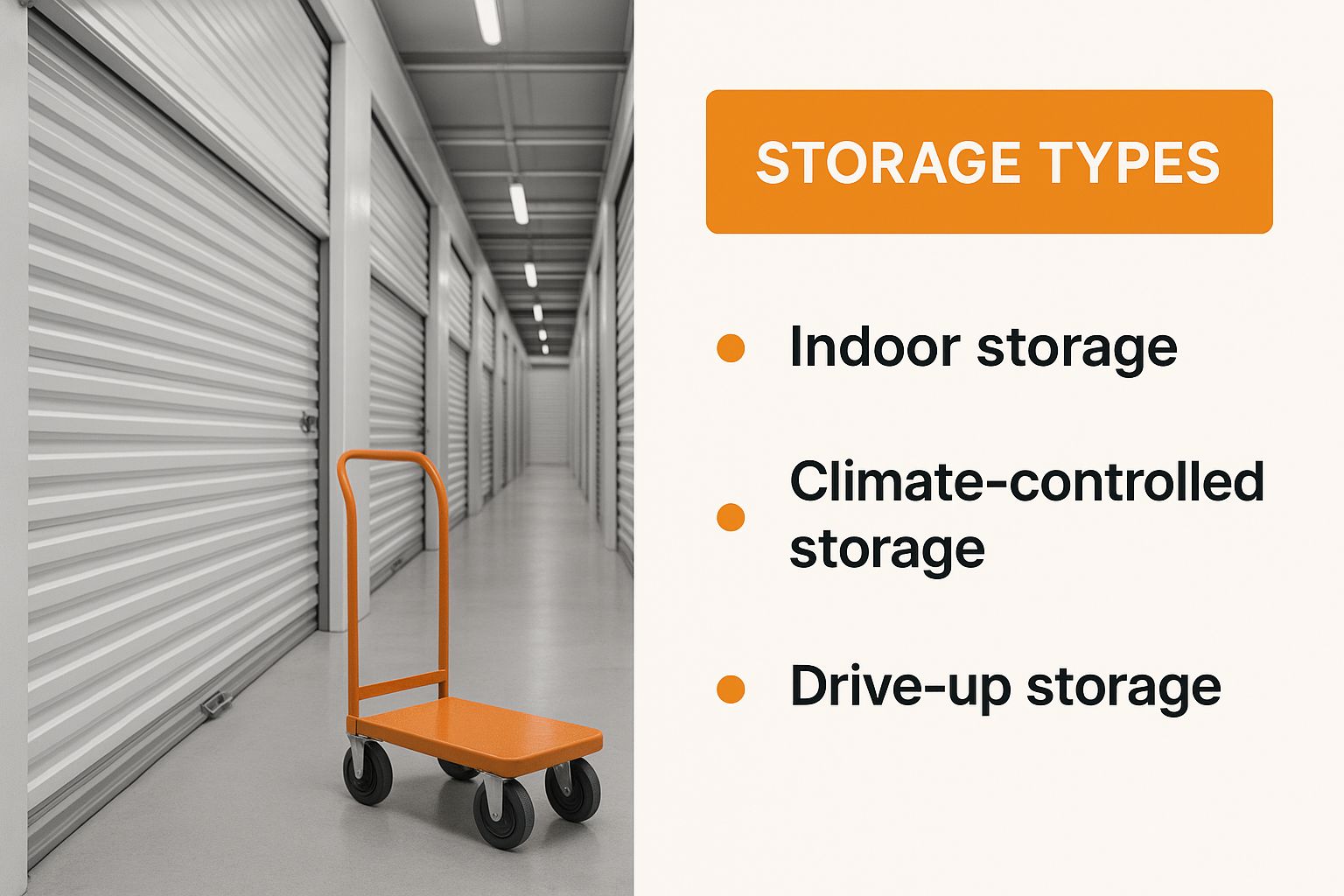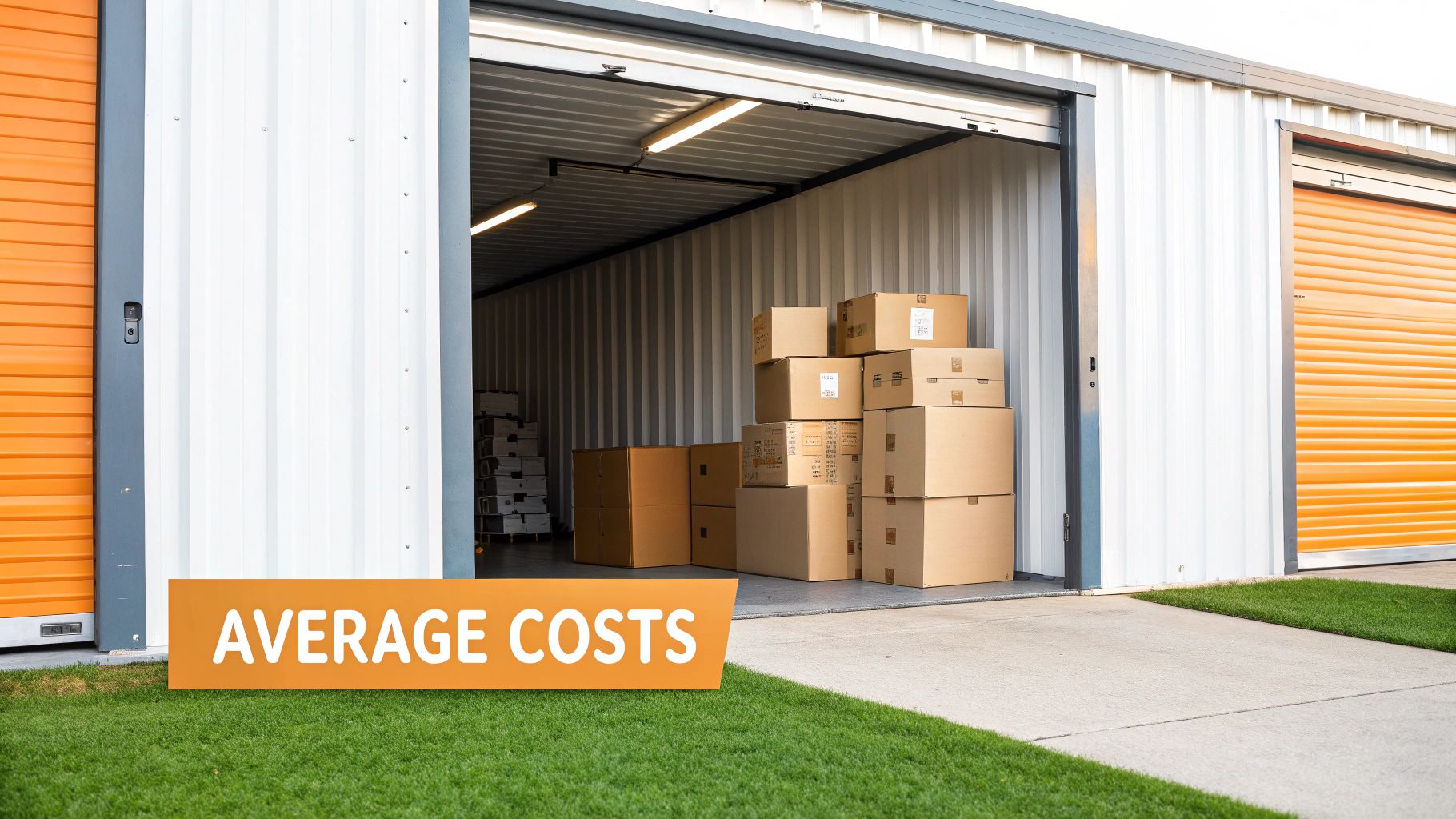So, how much does self-storage actually cost in the UK? The short answer is: it depends. You could be looking at anything from £10 a week for a small locker to well over £100 a week for a unit big enough to swallow the contents of a family home. As with most things, the final price tag really comes down to size and location.
UK Storage Costs: A Quick Overview
Before we get into the nitty-gritty, let's look at the bigger picture. Storage prices aren't set in stone; they move with the market. For instance, the national average price per square foot has been creeping up, rising from £26.23 in 2023 to £29.13 in 2024.
This trend is even more noticeable in hotspots like the South East, where average costs hit £33.90 per square foot in 2024. Why the jump? A surge in home movers and high occupancy rates are pushing prices up. You can find more details on these storage price trends and regional differences online.
To give you a clearer idea of what to budget, we’ve put together a table breaking down typical weekly costs across the UK. It’s a handy starting point for figuring out what you might expect to pay.
Average Weekly Self-Storage Costs in the UK by Unit Size
This table provides estimated weekly price ranges for common self-storage unit sizes across different regions in the UK to help you budget.
| Unit Size (sq ft) | Typical Use Case | London & South East (per week) | Midlands & North (per week) | Scotland & Wales (per week) |
|---|---|---|---|---|
| 25 sq ft | Small flat or student belongings | £25 – £40 | £15 – £25 | £12 – £22 |
| 50 sq ft | 1-bedroom flat contents | £40 – £65 | £25 – £40 | £22 – £35 |
| 100 sq ft | 2-bedroom house contents | £65 – £100+ | £40 – £60 | £35 – £55 |
| 150 sq ft | 3-bedroom house contents | £100 – £150+ | £60 – £90 | £55 – £80 |
As you can see, where you are in the country makes a huge difference. A 100 sq ft unit that might set you back over £65 a week in London could be almost half that price in parts of Scotland or Wales. Keep these regional variations in mind as you start your search.
What Really Drives Your Storage Price
Have you ever wondered why two storage units of the same size can have such wildly different prices? The answer is a bit like booking a hotel room – your final bill is a blend of location, size, duration, and convenience. Several key factors are always at play when it comes to self-storage costs in the UK.
Getting a handle on these elements is the first step to finding a great deal. For instance, a facility in a prime city centre location will always command a higher price than one on the outskirts of a smaller town. It all comes down to higher operational costs and demand. In the same way you wouldn't rent a five-bedroom house for one person, choosing the right unit size ensures you only pay for the space you truly need.
The Core Price Drivers
Your quote is essentially built on four main pillars. Each one plays a big part in shaping your final monthly or weekly payment.
- Geographic Location: A unit in central London is going to cost significantly more than an identical one in a northern town. Simple as that.
- Unit Size: The bigger the space, the higher the rent. Accurately figuring out your needs is vital to avoid overspending.
- Rental Duration: Many facilities offer better rates for longer commitments. Pre-paying for six or twelve months can often unlock substantial discounts compared to a rolling monthly contract.
- Accessibility Level: A unit with 24/7 access gives you ultimate flexibility but often comes at a premium compared to one with standard business hours.
This infographic gives a good visual breakdown of the different types of storage available.
As you can see, different storage options cater to all sorts of needs, from personal bits and pieces to entire business inventories.
The UK self-storage market is a surprisingly dynamic industry, with turnover rocketing past £1.2 billion in 2024. This growth is fuelled by an average rental return of £29.13 per square foot, which really shows how these price drivers work across the country. To see a more detailed breakdown, check out our guide on the top self-storage price factors. You can also explore more data on the expanding UK market in the latest Cushman & Wakefield report.
So, What Do Premium Features Add to the Bill?
It's a simple truth: not all storage units are made equal. A basic lock-up is a world away from a high-tech facility, and the price tag will absolutely reflect that difference. It's a bit like choosing a car—the base model gets you from A to B just fine, but if you want extras like heated seats or advanced safety features, you're going to pay a bit more.
In the world of self-storage, these premium features are all about giving you better protection and more convenience. One of the biggest upgrades you'll see is climate control. These units hold the temperature and humidity steady, stopping extreme cold or heat from causing damage. If you're storing anything delicate—think wooden furniture, electronics, artwork, or important documents—this isn't really a luxury. It's essential protection against warping, mould, and rust.
Advanced Security and Access
Beyond keeping the temperature just right, the level of security is another huge factor driving storage costs in the UK. Every facility has basic security, of course, but the premium options add serious layers of protection.
These can include things like:
- Individually alarmed units that sound an alert if someone tries to tamper with your specific door.
- AI-powered CCTV surveillance that intelligently keeps an eye on everything, 24/7.
- Secure electronic access systems that log every single person who comes and goes.
These tech upgrades have really started to shape self-storage pricing. Facilities that offer perks like 24-hour access, keyless entry, and AI-monitored CCTV often have higher rates to cover the cost of these enhanced services.
This move towards a more digital, secure experience is changing what people expect from their storage provider. In major cities, you'll see units with these kinds of features ranging from £12 to £45 per week for a standard 25 sq ft space, all depending on just how much tech is packed in. You can get a deeper dive into how technology is influencing storage costs across the UK.
Ultimately, knowing what these features are helps you make a smart call. You can decide what’s a must-have investment to protect your belongings and what's an extra expense you can probably do without.
Uncovering the Hidden Costs of Self Storage
The weekly or monthly rate you see advertised is rarely the full story. If you want to get a true picture of how much storage costs in the UK, you need to look beyond the headline price and be aware of the extras that can bump up your final bill.
Thinking the quoted price is all you'll pay is a classic mistake. Many facilities have mandatory charges that aren't folded into the initial quote, which can turn a seemingly good deal into a more expensive reality.
Common Additional Charges to Expect
Before you sign on the dotted line, it's vital to ask about these potential add-ons. Knowing what to expect helps you budget properly and avoid any nasty surprises later on.
Here’s a quick checklist of costs to clarify with any facility:
- Security Deposit: Most places require a refundable deposit, which is usually the same as one or two weeks' rent. You get this back when you leave, but it’s an upfront cost you need to factor in.
- Padlock: You’ll need a specific type of high-security padlock for your unit. Many sites insist you buy one directly from them to ensure it’s compatible with their doors and meets their quality standards.
- Administration Fees: Some companies charge a one-off setup fee. This usually covers the cost of processing your paperwork and getting your account created.
- Price Hikes: That low introductory offer might look tempting, but what happens when it ends? Always ask what the standard rate will be after the initial period is over, as prices often increase.
A significant and often mandatory extra is insurance. While it provides essential protection for your belongings, it’s crucial to understand your options.
Most facilities require you to have cover, and they'll happily sell you their own policy. However, it's always worth checking if you can use your existing home contents insurance instead. Exploring all your options for storage unit protection can sometimes save you a decent amount of money while making sure your valuables are properly covered.
Practical Ways to Lower Your Storage Costs
So, you understand what drives storage prices in the UK. Now for the fun part: putting that knowledge to work to save some cash. With a few smart moves, you can seriously shrink your monthly bill without giving up the security or convenience you need.
The best strategy starts before you even Google a single storage facility: declutter ruthlessly. Paying to store things you don't actually want or need is like setting fire to a pile of fivers. Take a weekend, sort through everything, and be honest about what you should keep, sell, donate, or just bin. This one step often means you can get away with a much smaller—and cheaper—unit.
Once you know exactly what’s making the trip to storage, you can start the hunt with a massive head start.
Smart Shopping and Strategic Planning
Getting the best deal on a storage unit takes a bit of digging and a willingness to be flexible. Don't just take the first quote you get.
- Compare Extensively: Get quotes from the big national chains and the smaller, independent outfits. Local operators can often be more competitive on price and a bit more accommodating with their terms.
- Look Beyond the City Centre: Prices drop significantly the further you get from a major urban hub. A facility just a few miles out of town could save you a bundle, as long as it’s still practical for you to get to.
- Seek Out Introductory Offers: Lots of companies run deals like the "first month for £1" or 50% off for the first eight weeks. These are brilliant value, but always, always ask what the standard rate will be once the promo period is over.
Maximising your space is another key tactic. Think of it like a game of Tetris. Pack your unit efficiently using sturdy, stackable boxes, take furniture apart, and use shelving to make use of every inch of vertical height. The better you pack, the less space you'll need to pay for.
While the context is a bit different, some fantastic smart tips to save money on logistics can be surprisingly useful for self-storage. The core principles of planning ahead and negotiating are valuable whether you're shipping a pallet or storing a sofa—it's all about trimming those extra costs.
Choosing the Right Unit Size to Save Money
Paying for space you don't use is the fastest way to waste money on self-storage. You wouldn't rent a double garage just to store a few archive boxes, right? The key to getting great value is picking a unit that’s just right for your belongings—not too big, not too small.
It helps to visualise the space. A small 25 sq ft unit feels a lot like a large garden shed, making it perfect for a student’s things or the contents of a small studio flat. If you need more room, a 100 sq ft unit is roughly the size of a single garage and can comfortably hold the furniture from a typical two-bedroom home. Getting this choice right from the start is fundamental to keeping your storage costs down.
Which Storage Unit Size Do You Need?
Guesswork can be expensive. To help you get a clearer picture, this quick reference table matches common unit sizes with the kind of items they typically hold. It’s a simple way to find the most cost-effective option for your needs.
| Unit Size (sq ft) | Roughly Equivalent To | What It Can Hold |
|---|---|---|
| 25 | A large garden shed | Contents of a small studio flat, student belongings, or business archives. |
| 50 | A large walk-in wardrobe | Furniture from a one-bedroom flat, including a sofa, bed, and boxes. |
| 75 | A Luton van | Contents of a two-bedroom flat, including appliances and bulky furniture. |
| 100 | A single car garage | All the items from a standard two-bedroom house move. |
| 150 | A large single garage | Furniture and belongings from a three-bedroom house, plus garden tools. |
Remember, this is just a starting point. To avoid paying for empty air or running out of room, it's always best to be sure.
Matching Your Items to a Unit
For a really detailed breakdown of what fits where, our comprehensive self-storage size guide has visual aids and checklists to help you nail down the perfect size.
Picking a unit that’s even one size too large can easily add hundreds of pounds to your bill over a year. A careful assessment before you book is one of the most effective ways to save money.
Your Top Questions About UK Storage Costs Answered
To wrap things up, let's tackle a few of the questions we hear most often about UK storage costs. Getting clear on these points can help you budget properly and sidestep any common pitfalls.
Do I Have to Pay for Storage Insurance?
Yes, just about every storage facility in the UK will require your items to be insured. Most will offer their own policy for an extra fee, but it’s always worth checking if you can use your home contents insurance instead.
Some policies already cover goods kept in storage, which could be a simple way to save some money. Just be ready to show proof of your cover.
Are There Discounts for Long-Term Storage?
Absolutely. Many facilities are happy to offer better rates if you commit to a longer rental period. Keep an eye out for deals when you pre-pay for six or twelve months at a time.
If you know you’ll need storage for a while, always ask about their long-term pricing. It can work out quite a bit cheaper than a rolling monthly contract.
Can My Storage Price Go Up During My Rental?
It can, and this is a really important detail to check. It’s quite common for companies to draw you in with a low introductory rate that increases after the first few months.
Always read your contract carefully to understand their policy on price rises. It’s also a good idea to ask what the standard rate will be after the initial offer ends so there are no surprises down the line.
Ready to find a storage solution that fits your needs and your budget? At Standby Self Storage, we believe in transparent pricing, flexible terms, and secure units you can count on. Get an instant quote and book your unit online today!




